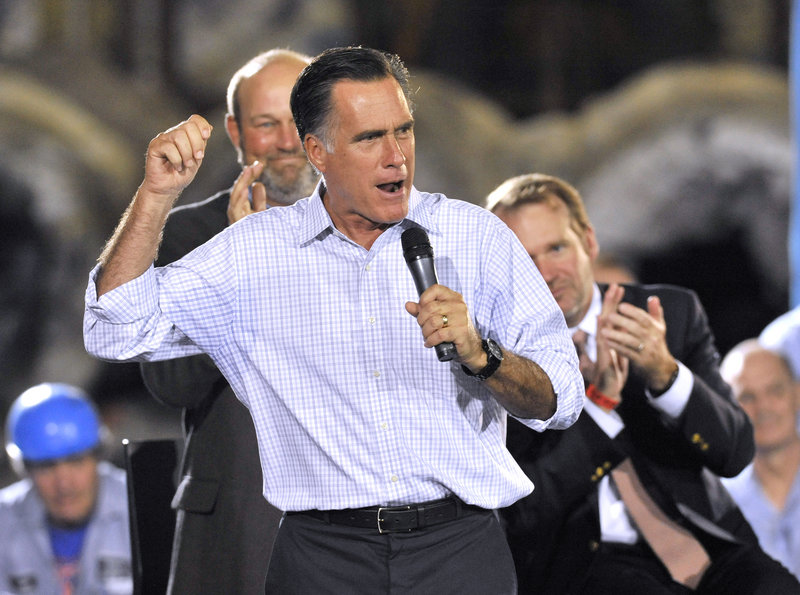WASHINGTON — The battle for control of the Senate, which had favored Republicans for much of this election year, has abruptly shifted, with Democrats sharply improving their odds of keeping the majority.
Along with recent missteps by presidential nominee Mitt Romney, the erosion of Republican prospects in the Senate has contributed to a grim feeling among party activists that an election year that once held out the possibility of regaining full control of the government could be souring on them.
Republicans entered the election season with fewer incumbents to defend and many opportunities to pick up seats from Democrats at a time when President Obama’s approval rating had dipped to a low point.
They need to gain a net of four seats to wrest away the majority that Democrats have held since 2006 — or three seats if Romney takes the White House, giving his vice president the tie-breaking vote. With nearly 24 seats held by Democrats up for grabs this November, the routes to a Republican majority were many.
But in races from Virginia to Wisconsin, recent polls have shown a shift in Senate contests in favor of the Democrats, and the weakness of some Republican candidates has limited the party’s prospects.
Strategists in both parties say that part of the problem may be that Romney’s campaign stumbles are hurting Republican candidates. At the same time, Obama and his fellow Democrats have enjoyed a lift since their national convention.
In one of the marquee races of the season, the Democratic candidate in Massachusetts, Elizabeth Warren, took a lead in four recent surveys after a prime-time turn on the stage at the convention. Incumbent Republican Sen. Scott Brown led in one poll. The seat is a must-hold for the Republicans.
Another Republican-held seat in New England became a problem for the party earlier this year when Maine’s Olympia J. Snowe announced her retirement. Former Gov. Angus King, an independent, is heavily favored to win. He has not said which party he would caucus with if elected, but Republicans have campaigned hard against him, believing that he leans toward the Democrats.
And as those Republican-held seats have become unsafe, some pickups the party had been counting on have begun looking less certain.
In Virginia, where the contest was dead-even for months, Democratic candidate Tim Kaine appears to have taken a lead over George Allen in a battle between two former governors. And in Wisconsin, three recent polls have shown Democrat Tammy Baldwin moving into at least a tie with former Gov. Tommy Thompson.
Some of the recent Democratic gains could fade, analysts note.
As in the presidential race, many Senate campaigns are being fought among a slim slice of undecided voters, and the quirks of each matchup can play a decisive role.
“Candidates matter,” said Jennifer Duffy, who analyzes races for the nonpartisan Cook Political Report.
In Missouri, for example, after Republican Todd Akin made his comments on “legitimate rape” last month, key party leaders essentially walked away from the race. Some conservatives such as Newt Gingrich have rallied to Akin, but polls show the Republicans may lose perhaps their best opportunity to defeat a Democratic incumbent, first-term Sen. Claire McCaskill.
Similarly, tea party favorite Richard Mourdock’s primary victory over veteran Sen. Richard G. Lugar in Indiana has complicated Republican chances of keeping that seat in the GOP column.
Even in heavily Republican North Dakota, Democrat Heidi Heitkamp, a former state attorney general, is putting up a strong fight against Rep. Rick Berg for a longtime Democratic seat that Republican strategists had counted on capturing.
Several Democratic senators up for re-election initially appeared vulnerable because they were first elected six years ago during the backlash against George W. Bush and the Iraq war. But Republican hopes of defeating those incumbents have cooled. In Ohio, for example, the challenger to Democratic Sen. Sherrod Brown has struggled.
In the swing state of Florida, Republicans have not produced a strong challenge to Democratic Sen. Bill Nelson.
“The perception is we have weak candidates all around,” said one Republican strategist, granted anonymity to speak frankly about the situation. Still, he noted: “We’re far, far from throwing in the towel.”
Republicans remain heavily favored to win a Senate seat in Nebraska, where Sen. Ben Nelson is retiring.
Another bright spot for the party is in Connecticut, a decidedly blue state where former wrestling executive Linda McMahon has tapped her personal fortune to make a competitive race of it with Rep. Christopher Murphy, the Democratic candidate.
Democratic Sen. Jon Tester is locked in a tight contest in Montana, and in Nevada, incumbent Republican Sen. Dean Heller still appears to have the edge in his re-election bid.
“Seven weeks is an eternity in politics,” said Brian Walsh, communications director of the National Republican Senatorial Committee, “and no one in either party should be taking anything for granted.”
Send questions/comments to the editors.


